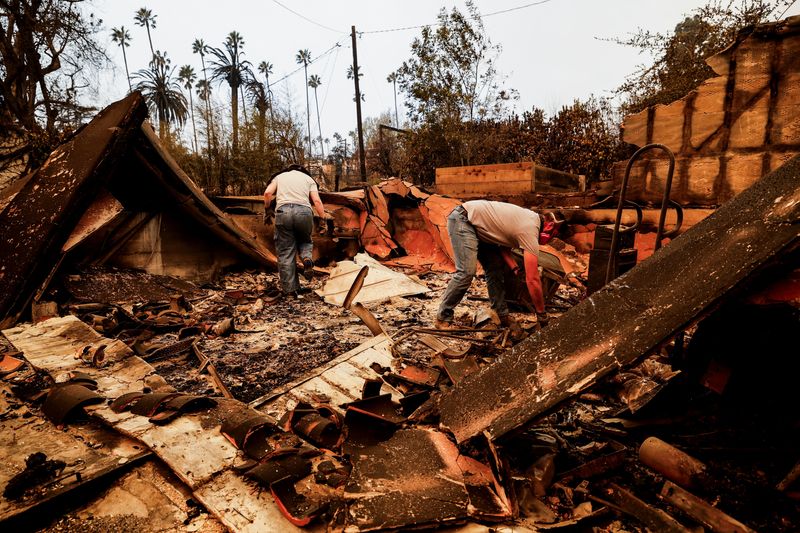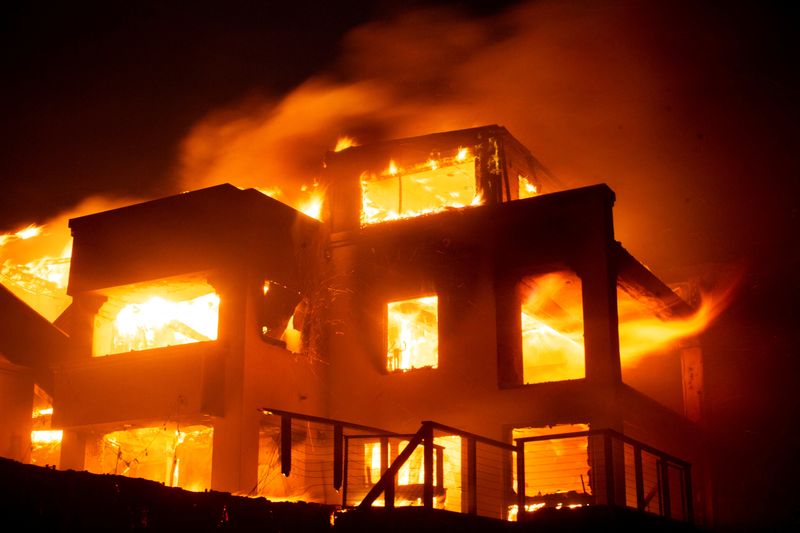By Jackie Luna and Maria Alejandra Cardona
LOS ANGELES (Reuters) -Two massive wildfires menacing Los Angeles from the east and west were still burning uncontained on Thursday, but a brief respite from the fierce winds that have fanned the flames for two days allowed crews to slow their explosive spread.
The Palisades Fire between Santa Monica and Malibu on the city's western flank and the Eaton (NYSE:ETN) Fire in the east near Pasadena already rank as the most destructive in Los Angeles history, consuming nearly 28,000 acres (11,330 hectares) so far - an area exceeding the size of Disney (NYSE:DIS) World - and turning entire neighborhoods to ash.
At least five people have been killed, thousands of structures have been incinerated and nearly 180,000 people have been ordered to evacuate their homes, with another 200,000 under evacuation warnings, officials said.
The death toll is likely to rise, Los Angeles Sheriff Robert Luna told a press conference on Thursday morning.
The Eaton Fire's growth has been significantly stopped, Los Angeles County Fire Chief Anthony Marrone said, though it remains 0% contained. While still strong, winds have diminished since the 100-mile-per-hour (160-kph) gusts seen earlier in the week, permitting crucial aerial support for crews on the ground.
"We have a much better posture than we did on Tuesday and Wednesday," said Marrone.
But officials warned that the wind was forecast was due to intensify again in the evening, with gusts of up to 60 mph (96.5 kph). Kristin Crowley, chief of the Los Angeles City Fire Department, said residents should be prepared to evacuate if ordered.
In Pacific Palisades, an upscale and picturesque enclave where many celebrities reside, once-palatial homes stood in ruins, while downed power lines and abandoned cars littered the roadways. The smell of heavy smoke filled the air, and residents wearing masks rode bicycles, hoping to catch a glimpse of their damaged houses.
"It is safe to say that the Palisades Fire is one of the most destructive natural disasters in the history of Los Angeles," Crowley said.
Firefighting crews managed to beat back a third blaze, known as the Sunset Fire, which had forced mandatory evacuations in Hollywood and Hollywood Hills - including famous show-business locations such as the TCL Chinese Theatre and the Hollywood Walk of Fame - late on Wednesday.
The fire was fully contained, Los Angeles Mayor Karen Bass said on social media around midday on Thursday. No buildings were lost in the area, a city fire department spokeswoman said, and the evacuation order was lifted.
It was one of at least five separate wildfires burning in Los Angeles County on Thursday as powerful winds spread flames across parched ground that has seen no rain for months. Bass described it as a "perfect storm" of dangerous conditions.
The mayor, who was on an official trip to Ghana when the first fires broke out, has faced some criticism over whether the city was adequately prepared. She told reporters on Thursday that her focus right now was on protecting people and that the city would evaluate the response's effectiveness after the crisis is contained.
"We have to save lives, and we have to save homes," she said.
U.S. President Joe Biden was set to meet with top administration officials in the afternoon to discuss the federal response, the White House said.
VISIBLE FROM SPACE
The two biggest conflagrations - the Palisades and Eaton fires - formed a pincer around the city so enormous that it was visible from space.
The homes of movie stars and celebrities were among those consumed by flames, which tore through some of the world's most lavish real estate.
"We are heartbroken of course, but with the love of children and friends we will get through this," said film star Billy Crystal and his wife Janice, announcing that the Pacific Palisades home where they had lived since 1979 had been destroyed.
Media personality Paris Hilton said she was "heartbroken beyond words" after watching her beachfront house in Malibu "burn to the ground on live TV."
The fires struck at an especially vulnerable time for Southern California, which has not seen any significant rainfall for months. Then came the powerful Santa Ana winds, bringing dry desert air from the east toward the coastal mountains, fanning wildfires while blowing over the hilltops and down through the canyons.
The National Weather Service extended Red Flag warnings - issued when the risk for fire is high due to low humidity, high winds and warm temperatures - for Los Angeles and Ventura counties through 6 p.m. (2300 GMT) on Friday.
Water shortages caused some hydrants to run dry in affluent Pacific Palisades, wedged between Malibu and Santa Monica, officials said on Wednesday.
'SOMETHING OUT OF A MOVIE'
Some residents ventured back to areas the fire had already swept through, where brick chimneys were left looming over charred waste and burnt-out vehicles. The remnants of a tattered and scorched American flag flapped from a pole.
"I had just come from my family home where my mother lives that was burned to a crisp ... And then I came up to my home and - same thing. It's completely dust," said Oliver Allnatt, 36, wearing ski goggles and a filtered face mask as he took pictures of the ruins. "Basically just a chimney stack and a pile of ash. I mean, it's something out of a movie."
Thousands of Angelenos fleeing the flames sought refuge in temporary shelters. Foad Farid came in the gym of the Westwood Recreation Center with nothing but his car and his phone. Neighbors dropped off blankets, clothing, water, pizza and pet food.
Jeff Harris arrived towing his Feisty Fish Poke food truck and began serving meals. "I'm just here to help," he said.
Kevin Williams, at an evacuation center in Pasadena, said he knew it was time to run when gas canisters at his neighbors' homes began exploding under the heat.
"The wind whipped up, the flames were up about 30 or 40 feet high, and you hear 'pop, pop, pop.' It sounded like a war zone."
The scale and spread of the blazes stretched exhausted firefighting crews beyond their capacity.
Firefighters from half a dozen other U.S. states were being rushed to California, while an additional 250 engine companies with 1,000 personnel were being moved from Northern California to Southern California.
Canadian Prime Minister Justin Trudeau said his country had sent water bombers to Southern California to help, and that 250 Canadian firefighters were ready to deploy. The Canadian Armed Forces were standing by to move personnel and equipment.

Canada has experienced severe wildfires in recent years, driven by drought and extremely hot conditions that experts say will continue to worsen due to climate change.
"To our American neighbours: Canada's here to help," Trudeau said.
